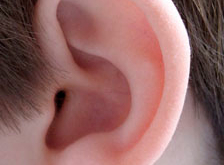귀 뚫기

Some people's ears/ produce wax/ like busy little bees. This can be a problem/ even though earwax/ appears to serve an important purpose.
Experts say/ it protects and cleans the ear. It traps dirt and other matter/ and keeps insects out. Doctors think/ it might also help protect/ against infections. And the waxy oil/ keeps ears/ from getting too dry.
So earwax/ is good. It even has a medical name: cerumen. And there are two kinds. Most people/ of European or African ancestry/ have the "wet" kind: thick and sticky. East Asians/ commonly have "dry" earwax.
But you can have too much/ of a good thing. The glands/ in the ear canal/ that produce the wax/ make too much/ in some people. Earwax/ is normally expelled; it falls out of the ear/ or gets washed away. But extra wax/ can harden/ and form a blockage/ that interferes with sound waves/ and reduces hearing.
People/ can also cause a blockage/ when they try to clean out their ears -- but only push the wax/ deeper inside. Earwax removal/ is sometimes necessary. But you have to use a safe method/ or you could do a lot of damage.
Experts/ at N.I.H., the National Institutes of Health, suggest some ways/ to treat excessive earwax/ yourself. They say/ the wax/ can be softened/ with mineral oil, glycerin or ear drops. They say/ hydrogen peroxide/ or carbamide peroxide/ may also help.
Another way/ to remove wax/ is known/ as irrigation. With the head upright, take hold of the outer part/ of the ear. Gently pull upward/ to straighten the ear canal. Use a syringe device/ to gently direct water/ against the wall/ of the ear canal. Then turn the head/ to the side/ to let the water out.
The experts at N.I.H. say/ you may have to repeat this process/ a few times. Use water/ that is body temperature. If the water/ is cooler or warmer, it could make you/ feel dizzy. Never try irrigation/ if the eardrum/ is broken. It could lead to infection/ and other problems.
After the earwax/ is gone, gently dry the ear. But if irrigation/ fails, the best thing/ to do/ is to go to a health care provider/ for professional assistance.
You should never put a cotton swab or other object/ into the ear canal. But you can use a swab or cloth/ to clean the outer part/ of the ear. The experts/ agree with the old saying/ that you should never put anything/ smaller than your elbow/ in your ear.

